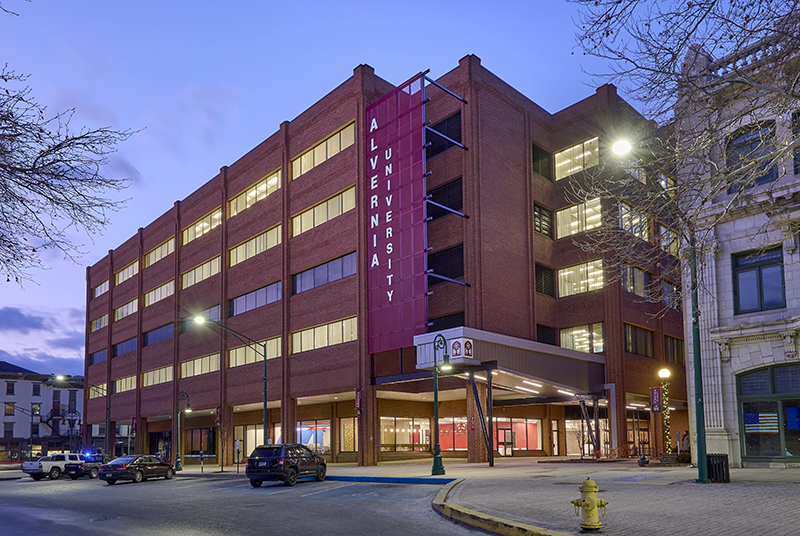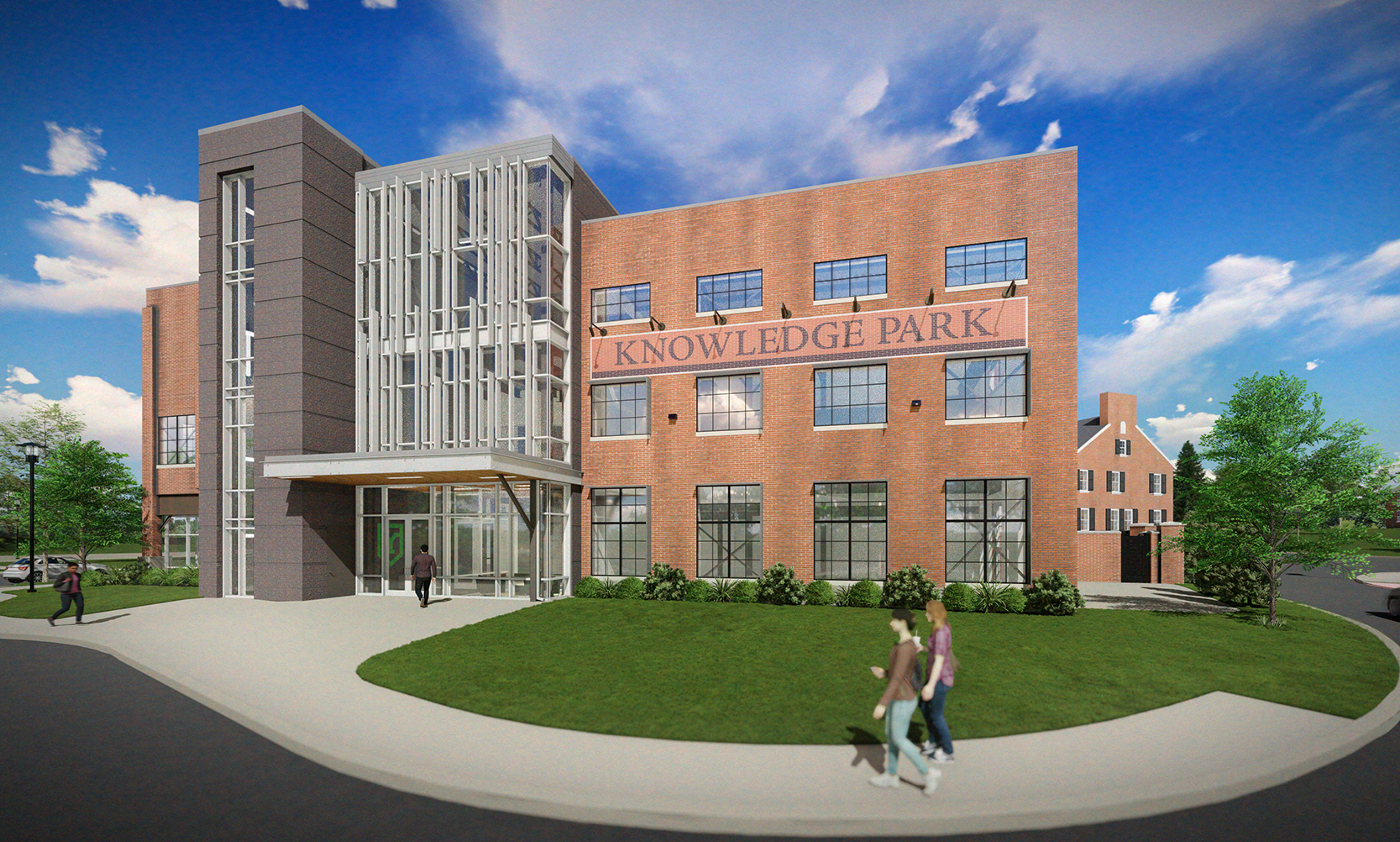Campus Redevelopment, Revitalization, and Resiliency
July 11, 2022How Community Partnerships Can Benefit Your Institution and the Surrounding Community

This topic was the focus of a panel discussion at the AICUP Campus Leaders Forum held in Harrisburg, PA on June 15th.
“We need to see ourselves no longer as an ivory tower surrounded by walls or fences but in the midst of the economies of which we exist and upon which we depend.” – Dominic DelliCarpini, Ph.D., York College of PA
While higher ed and industry have very different missions and cultures, there is a symbiotic relationship between the two. Finding a common ground for collaboration, research and work partnerships benefits everyone. As campus recruiting becomes more competitive, community partnerships serve as a positive differentiator and a valuable resource for long-term vitality.
Education as a Product
“Higher education is becoming more of a commodity than what it used to be.”- Rodney Ridley, Ph.D.,
Associate Provost and Vice President; COO, O’Pake Institute, Alvernia University
Higher education needs to adapt and change. Professors are actively pursuing new models of teaching and learning that meet the current times. These new pedagogical techniques, combined with experiential learning, will better prepare students for our rapidly-changing world, as well as engage them in this work in the present.
Today’s students need to be capable thinkers and ready to hit the ground running. This combination prepares them for meeting the demands of their career and the world at large. Experiential learning, hands-on internships and assisting with entrepreneurial innovations are just a few ways to translate classroom lessons to real-world work and offer students tangible skills. By forming community partnerships, higher ed institutions can implement programs that offer undergraduates a way to learn the skills they need while becoming a staunch supporter of local industry.
Community Partnerships in Practice
“When you come here, you are going to be working and learning not just in classrooms but learning and working out in the community.” – Dominic DelliCarpini, Ph.D., York College of PA
Two institutions have leveraged these relationships to provide the real-world experiences prospective students are seeking in a way that provides tangible value to business partners and the greater community. Both institutions embarked on redevelopment of properties that were no longer living up to their potential in their respective communities. With a pledge of revitalization, the institutions built their new ventures on a foundation of community partnerships with local government, business and industry.
Alvernia University and York College of Pennsylvania serve as models for campus redevelopment, revitalization, and resiliency. They have leveraged community partnerships to provide innovative learning experiences for students while offering value to businesses and strengthening the economy in their surrounding community.
Case Study 1: Alvernia University, John R. Post Center at Reading CollegeTowne
Alvernia University recently opened CollegeTowne in downtown Reading. CollegeTowne is the centerpiece of a multi-faceted academic, entrepreneurship and housing initiative. This mixed-use center provides living and learning opportunities for students. It also serves as a community resource for economic development with tenants including BCTV, Starbucks and Community First Fund.
Alvernia’s O’Pake Institute for Economic Development and Entrepreneurship is at CollegeTowne’s core. This student-powered business incubator brings students from the main campus downtown every day. Experiential learning opportunities are available for students, clients and mentors from local industry changemakers in CollegeTowne’s classrooms and labs. The O’Pake Institute also provides a support system for aspiring and developing entrepreneurs.
CollegeTowne also houses Alvernia University’s new engineering program which partners closely with local industry and provides students with the opportunity to participate in a co-op or research experience. With classrooms, state-of-the-art labs and on-site research facilities, the program has had immediate success and has shown signs of strong growth in just a few short years.
Case Study 2: York College of Pennsylvania, The Knowledge Park
 The Graham Center for Collaborative Innovation (GCCI) at York College of Pennsylvania is a critical link between faculty, students, industry and community partners. Strategic business partnerships facilitate Project-Based Learning, collaborative research and student co-op/internship opportunities or part-time work.
The Graham Center for Collaborative Innovation (GCCI) at York College of Pennsylvania is a critical link between faculty, students, industry and community partners. Strategic business partnerships facilitate Project-Based Learning, collaborative research and student co-op/internship opportunities or part-time work.
One of the key elements of the GCCI is the Knowledge Park which York College of Pennsylvania is currently developing on the edge of downtown York. A former mill and warehouse space is being reinvented into a Project Based Learning resource for academic, business and community partners. Knowledge Park offers real-world experience for students studying in multiple disciplines, from engineering and computer science to the liberal arts.
The warehouse structure will include small classrooms or conference rooms, a large seminar room and student study and collaboration spaces. Tenant businesses will have access to the knowledge resources that the college provides while students are provided hands‐on, real‐world experiences working with these businesses.
In both case studies, the schools have focused on providing resiliency for their institutions and economic development opportunities for their local community without compromising the high‐caliber educational experience that they are known to provide – instead, the educational experience has been elevated.
Developing Community Partnerships for Revitalization
- Nurturing a relationship with the public is key to a successful project and having a strong community partnership. Jeff Vermeulen, Assistant Vice President for External Relations at York College of Pennsylvania, recommends listening to what your individual community needs. Being responsive to those needs improves support and engagement for current and future projects planned by your institution.
- Communicating plans and progress of redevelopment and development projects further reinforces the sense of partnership. The sharing of academic resources, such as intellectual assets, with your business community also helps to grow your local economy and promotes interest in your institution’s revitalization projects.
- Another way to organically develop your community partnerships is to create opportunities for business and industry involvement on campus. Forming advisory boards and councils for various disciplines comprised of members of local business and industry can also help strengthen your relationships. This not only gets the community involved but it also facilitates coursework staying relevant to current needs.
- Creating ways to get students involved prior to companies being “on-site” also has positive effects. On campus, a Community Engagement Department or Center can provide opportunities to interact and recruit your area entrepreneurs. Once involved these entrepreneurs can work side-by-side with your students in a spirit of collaboration to advance ideas.
Business Incubator: A Key to Success
Both York College and Alvernia University assert that business incubators as part of their redevelopment programs have contributed to each program’s success and reinforced their community partnerships. The incubators have also helped local entrepreneurs flourish. Through leveraging faculty expertise, the start-up business can sometimes grow faster and go further than might have been projected.
A business incubator available through a higher education institution also benefits students. Undergrads have opportunities for hands-on, real-world experience as well as the chance to develop some of their own ideas. The local economy benefits through local jobs created with business incubator company growth.
Once everything is in place and up and running, then what? Continuing growth and development of additional space incentivizes successful incubator companies to remain a part of the local community and continue the partnership with the institution. Not only will a longer-term presence benefit the economy but recent higher ed graduates may find employment and choose to stay local. According to Jeff Vermeulen Assistant Vice President for External Relations, York College of Pennsylvania, “this kind of collaboration is one of the ways to reduce Pennsylvania’s brain drain — where educated people in their 20s and 30s leave the state.”
Business incubator projects can serve as an entry into the community for a higher ed institution. By providing additional spaces and opportunities for growth, the institution further strengthens its business and industry partnerships while cementing and reaffirming its place as a part of the local community.
Resiliency Through Community Partnerships
This shift in educational pedagogy is a must to be viable in today’s world and today’s economy and can be accomplished by higher education institutions of all sizes. Dr. Ridley believes that smaller schools need to learn to collaborate rather than compete when it comes to innovating approaches to teach students.
By working collaboratively, smaller institutions can transform and create change. Brainstorming meetings and scheduled calls where leaders from multiple institutions share best practices and new concepts can generate additional ideas and ways to innovate. Each institution should not be afraid of good ideas being stolen, instead they should know that they can adapt and enact these ideas to best suit their campus and community.
Redeveloping the way things have always been done and revitalizing campus programming will result in a resiliency that enables institutions to move forward and stand the test of time.
Thank you to the following contributors:
Dominic DelliCarpini, Ph.D.
Dean, Center for Community Engagement
Naylor Endowed Professor of Writing Studies
York College of Pennsylvania
Jeff Vermeulen
Assistant Vice President for External Relations
York College of Pennsylvania
Rodney Ridley, Sr., Ph.D., RTTP
Vice President of Research, Economic Development, and Innovation
Dean, College of STEAM
COO, O’Pake Institute
Alvernia University
Carson Parr, AIA, LEED AP BD+C, WELL AP is a partner at RLPS Architects. He leads the firm’s higher education practice, helping clients with campus programming and planning, project design and construction. An NCARB registered architect, Carson, holds a Master of Architecture, Community and Urban Design, from Pennsylvania State University. He serves as a student mentor and is a past president of AIA Central Pennsylvania, is co-chair of Central Pennsylvania Architect’s Foundation Fund (CPAFF) and is a York College of Pennsylvania Graham School of Business Dean’s Advisory Council Member.